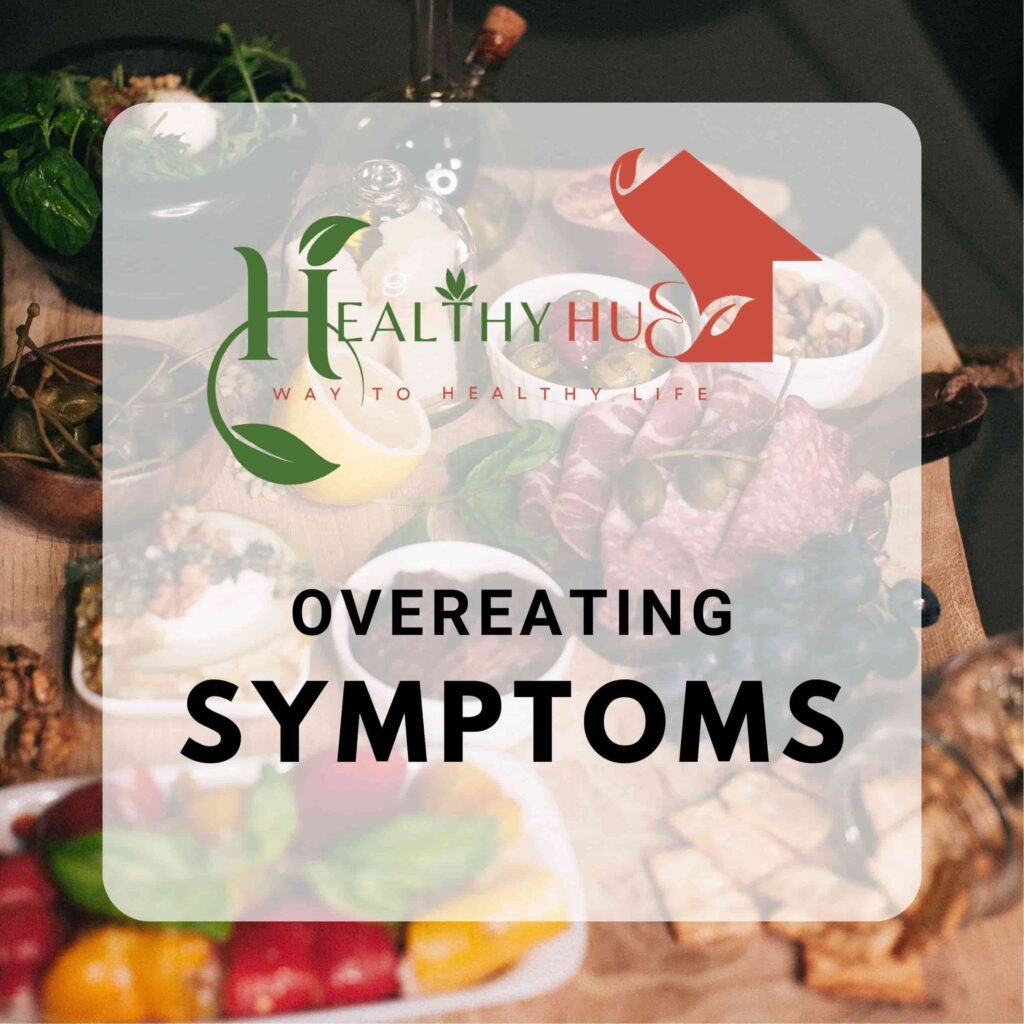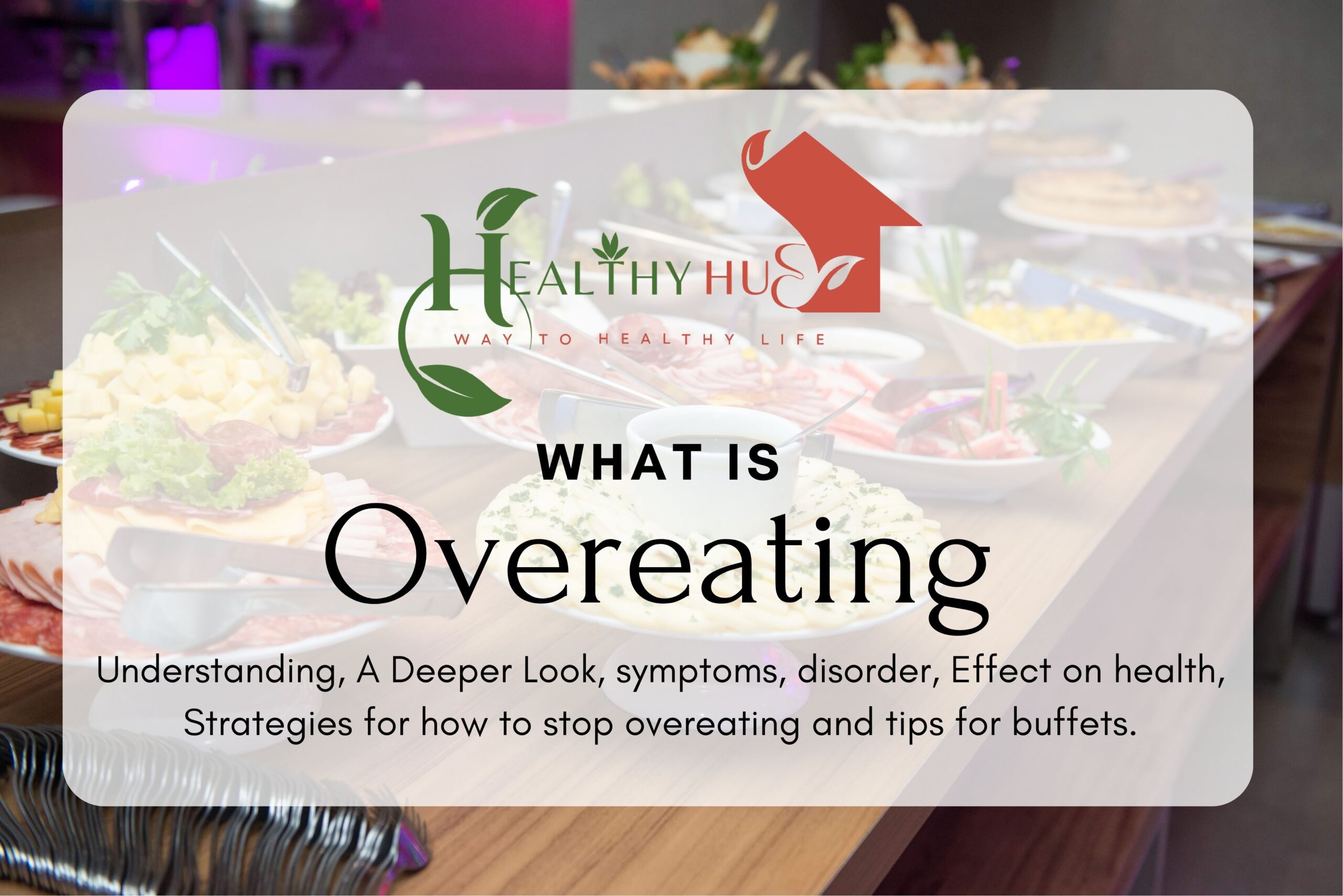Overeating: Understanding
In today’s fast-paced world, where food is abundant and easily accessible, overeating has become a prevalent issue, many people find themselves struggling with overeating. affecting countless individuals globally. It goes beyond merely satisfying hunger and becomes a coping mechanism for stress, boredom, or emotional distress. Overeating is a common issue that can have detrimental effects and can have severe consequences on both physical and mental health. This article delves into the concept of overeating, examining the causes of overeating, exploring its various effects on the body and mind, and providing valuable and practical strategies to curb this behavior and to combat this challenge.
A Deeper Look To Overeating
Overeating, often referred to as compulsive eating, is the act of consuming more food than the body requires to function adequately. It involves eating beyond the point of satiety, leading to discomfort and an array of health issues. Whether triggered by emotions, external cues, or an unhealthy relationship with food, overeating is a complex phenomenon that demands attention.
The Root Causes of Overeating
Overeating is not simply a matter of lacking willpower. Understanding the underlying causes of overeating is crucial to addressing this behavior effectively. Several factors contribute to the development of overeating tendencies, to this behavior, including psychological, emotional, and environmental elements. Let’s explore some of the primary causes of overeating:
1. Emotional Eating: Often, people turn to food as a way to cope with negative emotions like stress, anxiety, loneliness or sadness can drive individuals to seek comfort in food, resulting in overeating episodes. Eating can provide a temporary sense of comfort and distraction, leading to overeating.
2. Social Influence and Environmental Cues: Social gatherings and celebrations often revolve around food. Peer pressure and the desire to fit in can lead to overindulgence, even when not hungry. External factors, such as the availability of food, enticing advertisements, and social gatherings, can prompt individuals to overeat.
3. Food Addiction or Hormonal Imbalances: Certain foods, especially those high in sugar, fat, and salt, can trigger addictive responses in the brain, leading to a loss of control over consumption. Or hormonal fluctuations can disrupt the body’s hunger and satiety signals, leading to overeating.
4. Large Portion Sizes: With the increase in portion sizes offered by restaurants and fast-food chains, people tend to consume more than their body actually needs.
5. Lack of Mindful Eating and Boredom: Failing to pay attention to hunger cues and eating mindlessly can lead to excessive consumption. When people have idle time or are feeling unstimulated, they may eat out of sheer boredom. This mindless eating can lead to consuming excessive calories.

Recognizing Overeating Symptoms
Physical Symptoms
Identifying the physical signs of overeating can help individuals recognize their patterns of behavior. Symptoms may include weight gain, bloating, digestive issues, and an increased risk of chronic diseases like diabetes and heart conditions.
Emotional and Behavioral Signs
Overeating can also manifest through emotional and behavioral changes. Individuals may use food as a coping mechanism for dealing with stress, anxiety, or sadness. Frequent episodes of binge eating, feeling a loss of control around food, and eating in secrecy are common indicators.
The Effects of Overeating on Health
Overeating can have significant implications and can be severe consequences for our physical and mental well-being. Here are some of the adverse effects associated with overeating. Let’s examine:
1. Weight Gain and Obesity: The most apparent effect of overeating is weight gain, which can eventually lead to obesity. Obesity is a significant risk factor for various chronic health conditions, including heart disease, diabetes, and certain cancers.
2. Digestive Issues: Overeating can strain the digestive system, leading to discomfort, bloating, and indigestion. Chronic overeating may also contribute to the development of gastrointestinal disorders.
3. Emotional Distress: The cycle of overeating and subsequent guilt or shame can take a toll on mental health. Emotional distress may exacerbate the problem, leading to further overeating as a coping mechanism.
4. Cardiovascular Problems: Overeating foods high in saturated and trans fats can raise cholesterol levels and blood pressure, Excessive weight gain from overeating can contribute to cardiovascular diseases, increasing the risk like hypertension, heart disease and stroke.
5. Diabetes or Insulin Resistance: Frequent overeating, especially foods high in sugar and high-calorie foods or unhealthy fats, can lead to insulin resistance and can be elevate blood sugar levels and contribute to the development of type 2 diabetes.
Short-term Effects
In the short term, overeating can lead to discomfort, indigestion, and a feeling of lethargy. Additionally, it may affect an individual’s self-esteem and body image, contributing to negative emotions.
Long-term Consequences
Over time, chronic overeating can significantly impact overall health. Weight gain and obesity-related health issues become more likely, putting individuals at risk of conditions like type 2 diabetes, hypertension, and cardiovascular diseases.
Psychological Factors
Stress and Emotional Eating
Stress and emotional factors play a significant role in overeating behaviors. Many people turn to food as a way to cope with stress, seeking comfort in the pleasure of eating.
Binge Eating Disorder
Binge eating disorder is a severe condition characterized by recurrent episodes of compulsive overeating. Individuals with this disorder may consume large quantities of food within a short period, feeling unable to stop despite feelings of distress.
Social and Environmental Influences
Cultural Norms and Food
Cultural norms and traditions surrounding food can influence eating habits and portion sizes. In some societies, food is linked to celebrations and social gatherings, leading to overindulgence.
The Role of Food Advertising
Food advertising, especially for unhealthy and calorie-dense options, can tempt individuals to overeat. Clever marketing tactics often target vulnerable audiences, making it challenging to resist the allure of certain foods.
How to Stop Overeating for a Healthy Lifestyle
In a world of abundant food choices and busy schedules, overeating has become a common problem for many individuals. Consuming excessive calories not only leads to weight gain but also negatively impacts overall health and well-being. However, with mindful practices and some lifestyle changes, it is possible to break free from overeating habits and embrace a healthier lifestyle. In this Section, we will explore various strategies and techniques to help you regain control over your eating habits and achieve a balanced and healthier life.
Strategies To Curb Overeating Behavior and Overcome This Challenge
Breaking the habit of overeating requires a combination of self-awareness, behavioral changes, and a supportive environment. Thankfully, there are effective strategies to combat overeating and develop a healthier relationship with food. Implementing these approaches can lead to a more balanced and mindful eating habit and can be curb overeating:

1. Practice Mindful Eating
One of the most effective ways to stop overeating is to practice mindful eating. Paying full attention to your meal, savoring each bite, and eating slowly can help you recognize when you are genuinely satisfied. Mindful eating also allows you to enjoy your food and prevents mindless binging. Practice mindful eating by paying attention to hunger and fullness cues while eating. Chew slowly and savoring the flavors of each bite, allowing the brain to register satisfaction. Avoid distractions while eating, such as watching TV or using electronic devices.
2. Identify Triggers
Recognize emotional triggers that lead to overeating and find alternative ways to cope with stress or emotions. Engage in activities like meditation, exercise, yoga, or hobbies to divert your mind from food.
3. Control Portion Sizes
Be mindful of portion sizes and avoid overloading your plate. Opt for smaller plates and bowls to give the illusion of a full meal. Practicing portion control is vital in preventing overeating. Use smaller plates and be mindful of serving sizes to avoid taking in more calories than your body needs.
4. Create a Meal Schedule
Stick to regular meal times to avoid excessive snacking throughout the day. Having structured meals can help regulate hunger and prevent impulsive eating. Creating a meal plan and sticking to it can prevent impulsive food choices. When you know what you will eat in advance, you are less likely to give in to unhealthy cravings and temptations.
5. Control Stress
Stress can lead to emotional eating, causing you to turn to food for comfort. Finding effective stress-reduction techniques such as yoga, meditation, or regular exercise can significantly impact your eating habits and overall well-being.
6. Maintain a Food Journal
Keep track of eating patterns and emotions related to eating in a journal. This practice can help identify patterns and triggers for overeating. Maintaining a food journal can help you track your eating habits and identify patterns of overeating. This awareness can empower you to make healthier choices and break free from overindulgence.
7. Stock Up on Healthy Options
Keep your kitchen stocked with nutritious and satisfying foods. Fruits, vegetables, whole grains, and lean proteins should be readily available to make healthier choices easier. Having healthy snacks readily available can save you from reaching for unhealthy treats when hunger strikes between meals. Opt for fruits, nuts, yogurt, or whole-grain crackers to keep your energy levels stable.
8. Get Enough Sleep
Lack of sleep can disrupt hunger hormones and lead to increased appetite. Prioritize getting 7-9 hours of quality sleep each night to support your body’s natural processes and regulate your hunger cues.
9. Avoid Skipping Meals
Skipping meals can lead to excessive hunger later in the day, making it more likely to overeat during the next meal. Ensure you have regular, balanced meals to keep your metabolism steady.
10. Identify Emotional Triggers
Be aware of emotional triggers that prompt you to overeat. Instead of turning to food for comfort, find alternative ways to cope with emotions, such as talking to a friend, journaling, or engaging in a hobby.
11. Include Fiber in Your Diet
Foods rich in fiber, such as fruits, vegetables, and whole grains, can keep you feeling full for longer, reducing the likelihood of overeating.
12. Chew Your Food Thoroughly
Chewing your food slowly and thoroughly aids digestion and gives your brain time to register when you are full, preventing overeating.
13. Socialize Mindfully
During social gatherings, it’s easy to lose track of your eating habits. Be mindful of your food choices and portions when attending events to avoid overindulgence.
14. Celebrate Progress, Not Perfection
Breaking free from overeating habits takes time and effort. Celebrate your progress, no matter how small, and be patient with yourself. Embracing a healthier lifestyle is a journey, and every step counts.
15. Stay Hydrated
Drink plenty of water throughout the day, as thirst can sometimes be mistaken for hunger. Dehydration can sometimes be mistaken for hunger, leading to unnecessary calorie consumption. Drinking an adequate amount of water throughout the day can help curb false hunger pangs and support your overall health.
16. Create or Seek a Support System
Share your goals and struggles with overeating with friends, family, or a support group. Having a support system can provide encouragement and accountability.
17. Seek Professional Help
If overeating becomes uncontrollable or leads to emotional distress, seeking help from a therapist or counselor specializing in eating disorders can be beneficial.
Overeating is a prevalent issue with serious consequences for physical and mental health. Overeating is a multifaceted issue that affects millions of people worldwide. By understanding the root causes and recognizing its impact on physical and mental health, individuals can take proactive steps to curb this behavior and to overcome this challenge. Embracing mindful eating practices, seeking support, and addressing emotional triggers are essential strategies in breaking free from the cycle of overeating. Remember, change takes time and effort, so be patient with yourself. With dedication and support, you can develop a healthier relationship with food and lead a more balanced life, and seeking professional assistance is always an option for those who find overeating difficult to manage independently.

TIP # 03 | Be careful with buffets
Avoid overeating at buffets, just because the food is there.
Buffets can be a delightful culinary experience, offering an array of delectable dishes and an opportunity to indulge in various flavors. However, these all-you-can-eat setups can present a significant challenge to those trying to maintain a balanced diet and healthy eating habits. It’s all too easy to fall into the trap of overeating simply because the food is readily available. In this part, we will explore the psychology behind overeating at buffets, the negative consequences it can have on health and well-being, and effective strategies to resist the temptation.
The Temptation of Buffets
We all know that buffets are quite attractive and we all want to indulge in the deliciousness. Because obviously who can resist 50+ dishes and a range of sweet delicacies? Well in this tempting experience, we forget that buffets are full of calorie-dense, fat-rich, and carbs-loaded foods which can lead to cardiac problems, high cholesterol levels, high blood sugar levels, and obviously WEIGHT GAIN!
Walking into a buffet can be an overwhelming experience. The sight and aroma of so many dishes can trigger our appetite and lead to overindulgence. Moreover, the notion of unlimited servings may subconsciously encourage us to eat more than we actually need. Before we know it, we find ourselves heaping our plates with an assortment of dishes, many of which we might not even finish.
The Psychology Behind Overeating at Buffets
The “All-You-Can-Eat” Mindset
The all-you-can-eat pricing model creates a perception of getting the best value for money. People often feel the need to consume more to make the most of what they have paid for, even if it means overeating beyond their capacity.
The “Value for Money” Trap
In the pursuit of getting their money’s worth, individuals might prioritize quantity over quality, overlooking healthier options and making unhealthy choices instead.
Social Influence and Peer Pressure
The presence of friends, family, or colleagues at a buffet can exert peer pressure. People may mirror the eating behaviors of those around them, leading to excessive consumption.
Emotional Eating
Emotional factors, such as stress, sadness, or happiness, can also trigger overeating. Buffets, with their wide selection of comfort foods, can become an outlet for emotional eating.
The Negative Consequences of Overeating
Physical Health Risks
Overeating, especially high-calorie and fatty foods, can lead to weight gain, obesity, and various health issues such as heart disease, diabetes, and digestive problems.
Guilt and Regret
Post-buffet guilt is not uncommon. Overindulgence can leave individuals feeling remorseful about their lack of control and the negative impact on their health.
Impact on Mental Well-being
Overeating can take a toll on mental well-being, causing stress, anxiety, and a negative body image.
Strategies to Avoid Overeating at Buffets
Set Clear Intentions
Before going to a buffet, decide on reasonable portion sizes and food choices. Remind yourself of your health goals and the importance of moderation.
Survey the Options
Before filling your plate, take a walk around the buffet to assess the available options. Choose wisely and opt for healthier dishes whenever possible.
Control Portion Sizes
When you are ready to serve yourself always choose a smaller plate as it will control your portion size and ultimately avoid overeating. Avoid piling up your plate with excessive amounts of food. Start with smaller portions and only go back for seconds if you are genuinely still hungry. So dodge the normal diner plate on your next buffet day.
Healthier Food Choices
Secondly, always take a quick survey of all the available dishes and look for healthier ones like vegetables, grilled proteins, whole grains, etc. Now just fill your plate with healthier options and enjoy! Including a variety of nutritious and balanced dishes in the buffet selection can promote healthier eating habits among customers.
Mindful Eating
Savor each bite and eat slowly. Mindful eating allows you to enjoy the flavors fully and helps your brain register when you are full. Another important thing to mention is that to eat more and more food in less time many people just gulp their food which will lead to upset stomach and many GI problems. So make sure to chew your food properly so it can be digested easily, believe me it will save you from a lot of trouble because no one wants to spend their next morning in the Bathroom at least.
Stay Hydrated
Drinking water throughout the meal can help you feel fuller and reduce the temptation to overeat.
How to Handle Social Pressure
Politely decline to follow others’ eating habits if they do not align with your own intentions. Be confident in making healthy choices for yourself, regardless of what others might think.
The Role of Buffet Operators
Buffet operators can also play a part in encouraging responsible eating among their patrons.
Responsible Presentation
Arranging healthier options prominently and using appealing presentation techniques can nudge individuals towards making better food choices.
Encouraging Moderation
Signage or messages promoting moderation can serve as subtle reminders for guests to be mindful of their food intake.
Skip Sweet and Carbonated Drinks
One of the most important things is to skip sweet and carbonated drinks. Try One of Alternatives to Soda. Go for water instead, this helps you to avoid the consumption of unnecessary calories and sugars.

One thing that we all must have experienced in a buffet is the pressure to eat as much food as possible, so Avoid overeating at buffets, usually, we aim to try all the dishes available. And believe me, this is very bad for your health. It will lead to stomach problems, nausea, vomiting, and unnecessary weight gain. Remind yourself and your loved ones that
JUST THE FOOD IS THERE DOES NOT MEAN THAT YOU HAVE TO EAT IT ALL. Understand your body and stop when you are full.
Conclusion
Indulging in a buffet experience can be enjoyable, but it’s crucial to be mindful of our eating habits. Avoiding overeating at buffets requires awareness of the psychological traps, a clear intent to make healthier choices, and the ability to resist social pressure. By implementing these strategies, we can still relish the buffet experience without compromising our health and well-being. Well if you keep these few little things in mind such as Avoiding overeating at buffets, you can save your body from many problems and also enjoy your buffet to its fullest. After all, it’s about balance only!





